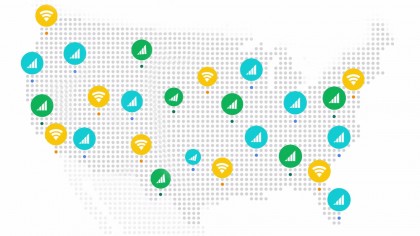Google launches Project Fi, its own take on wireless service
Works with the Nexus 6, but there's so much more

We heard it might launch today and now here it is, Project Fi, Google's own wireless service.
The new Google network initiative aims to re-imagine the lifeline of modern communication: wireless connectivity. Project Fi will explore how best to create seamless, easy-to-use and accessible connectivity for all, Google explained in a blog post, keeping connections strong as users move from home to work to wherever.
Like the Nexus program, Google is working with partners for Project Fi, so it's not going this new wireless-provider route alone.
The company is teaming up with US carriers Sprint and T-Mobile to use the companies' 4G LTE networks for the program, but since Project Fi is a hardware, software and connectivity initiative, stay tuned for more to join up.
Project Fi also works over Wi-Fi hotspot, so Google has essentially woven various networks together to create an amalgamated network it can call its own.
The Project Fi deets
The heart of Project Fi is that it determines which network will give users the best connection wherever they're located. That could mean hoping on a Wi-Fi hotspot or jumping onto a carrier's 4G LTE line. If you're on T-Mobile's 4G LTE network but Project Fi figures Sprint will be faster, you're automatically switched to Sprint.
As for the hotspots, Project Fi currently counts more than one million free, open Wi-Fi hotspots in its network. Encryption keeps data safe, Google promised.
Sign up for breaking news, reviews, opinion, top tech deals, and more.
Google is essentially (hopefully) taking the thinking out of connectivity, and part of this plan involves moving calls automatically from Wi-Fi to cell networks so that call quality never suffers.
Project Fi also puts users' phone numbers on the cloud, enabling them to keep talking and texting whether they're on a phone, tablet or laptop. If a user misplaces their phone, they can keep connected through these other devices. Any device that supports Google Hangouts works with this Project Fi function.

The Nexus 6 is the first smartphone to support Project Fi's "network of networks." New and currently owned Nexus 6s work with Project Fi. On the Fi FAQ page, Google went no further than to say that during the network's Early Access Program, "we plan to only support the Nexus 6."
As for the plan and price, Google is keeping it simple and cheap. Project Fi costs $20/month for basic services, including international coverage in 120+ countries. Users then pick how much cellular data they want, which are available in increments of $10 per GB (1GB is $10, 2GB is $20, etc.). Unused data is reimbursed with a credit for its full dollar value.
The pricing and straight-forward, customer-first plan should be highly appealing to consumers overwhelmed and frustrated by carriers' opaque pricing and plan structures.
Google Project Fi is launching via an Early Access Program, and interested users can request an invite to join. While the launch is limited to the US, it seems plausible Google could partner with international carriers to make Project Fi a global initiative.

Michelle was previously a news editor at TechRadar, leading consumer tech news and reviews. Michelle is now a Content Strategist at Facebook. A versatile, highly effective content writer and skilled editor with a keen eye for detail, Michelle is a collaborative problem solver and covered everything from smartwatches and microprocessors to VR and self-driving cars.